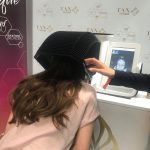By Dr Alison Owen (Lecturer in Health Psychology, Staffordshire Centre for Psychological Research)
 It has been suggested that exposure to ultraviolet (UV) radiation, including exposure to the sun and sunbeds, are the primary causes of all melanomas, leading to skin cancer (World Health Organization, 2018). Malignant melanoma is the second most common cancer in 15-34-year olds, and at least two young people in Britain receive this diagnosis every day (Cancer Research UK, 2018).
It has been suggested that exposure to ultraviolet (UV) radiation, including exposure to the sun and sunbeds, are the primary causes of all melanomas, leading to skin cancer (World Health Organization, 2018). Malignant melanoma is the second most common cancer in 15-34-year olds, and at least two young people in Britain receive this diagnosis every day (Cancer Research UK, 2018).
As a group, adolescents have been found to have poor sun protection practises, with research suggesting that as children progress into adolescence they are less under observation by their parents, so they need to take additional responsibility for their UV protective behaviours, a task that was left to their parents before this. It is therefore really important to come up with ways of informing adolescents about the impact that the sun and sunbeds can have on their skin, and the importance of protecting themselves form harmful UV rays.
Staffordshire University lecturers Dr Alison Owen, Professor David Clark-Carter and Dr Emily Buckley, along with Professor Sarah Grogan from Manchester Metropolitan University, decided to carry out an intervention aimed specifically at young people aged between 11 and 14 years of age, to show them the impact that UV exposure can have on their skin, in the hope that it would encourage them to think differently about protecting themselves from UV exposure.
The participants in their study were 237 adolescents, 60 of whom were randomly allocated to participate in the appearance-focused intervention condition and 176 to a control condition, who simply completed the questionnaires and did not receive an intervention. The researchers used a piece of computer software called AprilAge, which showed the young people projected images of themselves from their current age up to the age of 72 years, and allowed them to compare images of how they may look in the future if they did not protect their skin from the sun and sunbeds, in comparison to how their skin would look if they did protect it.
The adolescents who had participated in the intervention had significantly greater intentions to use sun protection, significantly more negative sun risk beliefs, lower sun benefit attitudes and higher perceived sun damage susceptibility after viewing the information given than participants in the control group, suggesting that this type of intervention is a really effective way to get young people thinking more positively about protecting their skin from the sun.
The research has recently been published in the British Journal of School Nursing, and the researchers hope that school nurses will be able to take the findings further, and use software such as the APRIL intervention in sessions with their young students, to get them thinking about the sun and the impact it can have on their skin. Please contact Dr Alison Owen at alison.owen@staffs.ac.uk if you have any questions about the research.
- Owen, A.L., Clark-Carter, D., Grogan, S., & Buckley, E. (2018). The impact of an appearance focused facial-ageing intervention on adolescents’ attitudes towards sun protection. British Journal of School Nursing, 13, 436-444.
Staffordshire University – The Home of Health Psychology
Staffordshire University has a history of excellence  in teaching and research in Health Psychology, and is home to Staffordshire’s BPS Accredited Stage 1 MSc in Health Psychology and Stage 2 Professional Doctorate in Health Psychology. The Staffordshire Centre for Psychological Research has active team of Health Psychologists who conduct research and provide consultancy in a range of health-related issues.
in teaching and research in Health Psychology, and is home to Staffordshire’s BPS Accredited Stage 1 MSc in Health Psychology and Stage 2 Professional Doctorate in Health Psychology. The Staffordshire Centre for Psychological Research has active team of Health Psychologists who conduct research and provide consultancy in a range of health-related issues.
Keep updated with the latest Health Psychology news from Staffordshire University via following us on @StaffsPsych and via the #HealthPsychStaffs hashtag.
For further information about Health Psychology courses and research at Staffordshire University please visit the following webpages:























